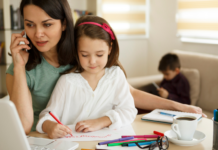The Beauty of Kindness
November 13 is World Kindness Day. As parents, one of our most important responsibilities is teaching our children to be kind, so that it’s instinctual for them to perform acts of kindness on a daily basis. Being raised with kindness creates a ripple effect, right? Kind kids turn into kind adults and the world becomes a kinder place, right? That’s what I hope.
Fortunately, my kids have pretty much only witnessed kindness in their daily lives. My six-year-old daughter’s elementary school even has “caring” as the first word of its motto. She’s never come home and told a story about a peer being mean. Several times, though, she’s come home with sweet notes or drawings from one of her friends. These “just because” acts of kindness make my heart burst. I send an email or text to the parent, expressing my appreciation and extending the circle of kindness.
Challenging Conversations
Teaching and acting with kindness is easy. But what’s hard, really hard, is how we help our kids emotionally respond when they see or learn about acts of unkindness.
I’m not sure how good of a job I’m doing with my six-year-old. She’s empathetic to the point of extreme sensitivity. She bursts into tears and has trouble speaking when she watches certain shows or movies where a character gets bullied, lied to, or killed. Similar reactions have occurred when she reads details about real people being persecuted for their background.
I immediately hug her and stroke her hair, trying to calm her down. I praise her kindness to validate her crying. I try to engage in a conversation about how even though it’s sad when mean things happen in the world, we have to find ways to make it better. That’s usually when she asks me to change the channel, shut off the movie, or put the book away. She has collected herself enough to voice the words, “I don’t like it.” And she shouldn’t, but I’m not sure my “solution” is the best.
I have obliged her requests and not pushed her to continue watching or reading. I have dropped the conversation and redirected her to something happier. On one hand, I understand she’s not ready to confront those big emotions out loud. It’s not worth exacerbating her pain.
On the other hand, shouldn’t I extend these discussions a bit longer? Shouldn’t I use these moments to coach her through those big emotions that she will undoubtedly confront some time when I’m not present? How will she work through her tears and heavy breathing when she really does experience or witness some act of unkindness? Am I inadvertently enabling her to shut down or run away?
And if I do keep pushing the conversation, what should I be encouraging her to do? Tell a trusted grown up, yes. But then what? Obviously, it’s all situational, so what scenarios do I model? Do I use my own examples from elementary school? Do I tell her about how a much older white girl approached me at recess to ask why I was playing with girls who weren’t white? Or how kids “jokingly” called me and a friend “Butterball and Breadstick?” Do I tell her that my reaction involved silence and retreating into my own confused thoughts? I don’t know. And that’s why I’ve avoided it so far.
Who Knows How Far It Reaches?
There’s a time and place for everything. Back in her school microcosm, she didn’t break down when she learned why Martin Luther King, Jr. was killed. She came home and talked about it. But she did break down when she “didn’t like” what was happening in a movie her after-school program was showing. Even though she was the only one who was upset, the teachers turned it off. Was that the best decision? I don’t know.
I wonder if her tears invited conversations in other kids’ homes. Maybe her peers told their parents she was sad and everyone wanted to make her feel better. Maybe the parents talked about how we never like to see or make people cry. Maybe I’m doing a better job than I give myself credit for, because of the ripple effect. Who knows?
I guess we all like to stick with what’s easiest: focusing on spreading kindness.

























